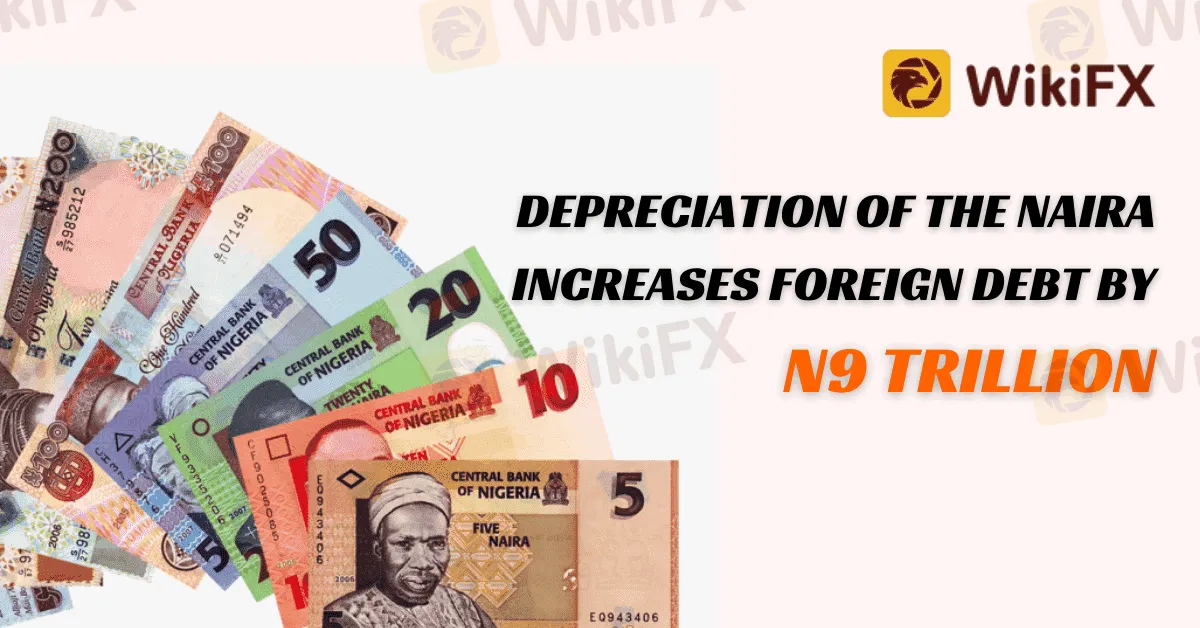Abstract:Nigeria's foreign debt burden increased as the value of the naira relative to the dollar dropped from N196.92 in June 2015 to N414.72 in June 2022.

...while foreign debt increases by 288% and local currency declines by 53%.
•Economists argue that Nigeria needs a robust, productive economy.
Nigeria's foreign debt burden increased as the value of the naira relative to the dollar dropped from N196.92 in June 2015 to N414.72 in June 2022.
The naira's value against the US dollar decreased by 52.52% throughout the course of the seven years under study.
According to a document titled Monthly Average Exchange Rates of the Naira (Naira Per Unit of Foreign Currency) for 2015 that was downloaded from the Central Bank of Nigeria website, the interbank foreign exchange market price for one dollar was N196.92.
According to the CBN's estimate, the value of one dollar was N414.72 as of June 30, 2022.
According to the Debt Management Office's external debt stock statistics, this indicated a growth of 288.18% in seven years.
According to a breakdown, the federal government has $7.05 billion in external debt in 2015, compared to the states' $3.27 billion.
State external debt reached $4.56 billion by 2022, compared to $35.5 billion for the federal government.
The debts include loans from bilateral lenders including China, France, Japan, Germany, and India as well as loans from multilateral lenders like the World Bank, the African Development Bank, and the International Monetary Fund.
Additionally, they contain obligations derived from commercial sources, such as Eurobonds and Diaspora Bonds.
Nigeria's external debt in naira terms would have been N7.89 trillion if the country's current $40.06 billion foreign debt were calculated using the CBN's average exchange rate for June 2015.
However, the total external debt in naira terms as of June 30 this year was N16.61 trillion, a difference of N8.72 trillion, based on the exchange rate of N414.72.
By implication, Nigeria's decision to repay the $40.06 billion external debt in 2022 will cost N8.72 trillion in naira. Given the then exchange rate of N196.92/$, Nigeria would have spent N8.72tn less had the same debt been taken out in 2015.
In response, Mr. Johnson Chukwu, Managing Director/Chief Executive Officer of Cowry Asset Management Limited, stated that a high level of external debt would place a significant burden on the economy in the form of debt servicing.
This will put a significant economic burden on the economy on top of already poor oil sales revenues, he claimed. The government will find it difficult to fulfill its debt service obligations to international lenders if oil sales revenue does not increase.
Nevertheless, he pointed out that Nigeria could cover its foreign debt at the current level, but a continuous rise in debt without a corresponding rise in foreign currency receipts might put the country in a tough situation.
Failure of policy
The CBN implemented a number of policies to control the value of the naira, including preventing 41 items from accessing foreign exchange on the official market, offering N5 for every $1 sent to Nigeria through internal money transfer organizations, and prohibiting the supply of foreign exchange to bureau de change.
These measures, however, have not been able to ensure the stability of the naira.
The World Bank has stated that it disagrees with the CBN's approach to achieving naira price stabilization and that the local currency should be allowed to respond to genuine forces rather than being restrained by the CBN.
The country's currency rate policy, it said, discouraged investment and raised the danger of inflation.
The CBN has allegedly failed to contain growing inflation and halt the naira's depreciation versus the US dollar, according to a Global Finance Report.
According to recent data from the International Monetary Fund, the naira has lost 10.6% of its value annually since 1973 at the long-term rate of depreciation.
The IMF estimates that over the same time period, this rate was 1.5 times higher than the long-term rates of the currencies of other emerging markets and developing countries, which stood at 7.2%, and sub-Saharan Africa, at 7%.
Its exchange rate had a more enduring depreciation, according to the IMF. In comparison to both EMDE (7.2%) and SSA, Nigeria's long-term rate of currency depreciation—an average of 10.6% annually since 1973—was 1.5 times higher (seven per cent). It is challenging to pinpoint the precise causes given the scarcity of long-term data.
Nigeria's local currency unit is expected to lose more ground next year, according to the Bank of America, as its current exchange rate to the dollar is far higher than its fair value.
They contend that an excessive reliance on help and loans from outside sources could harm the region's overall long-term growth.
While stressing that the debt profile of the majority of the sub-regional countries was rising, Gbenga Falana, Special Advisor to the Director (Custom Union and Taxation in ECOWAS), emphasized the need for West African countries to look inward and finance local projects through effective domestic resource mobilization.










